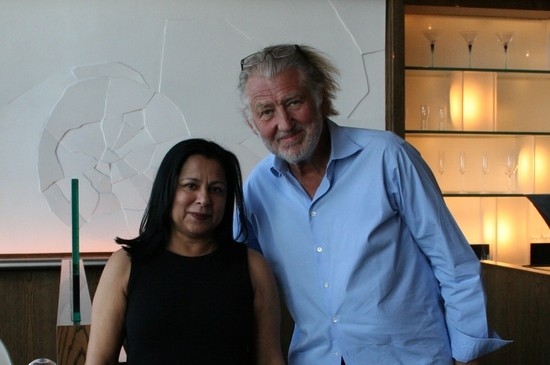
Every Monday, Clay Oven Irvine executive chef/owner Geeta Bansal
shares an interview that she's done with some of the heavyweights of
European cooking. Today, she regales us with a visit with Pierre Gagnaire, the legendary French chef. Enjoy!
]
How I Met Pierre Gagnaire
By Geeta Bansal, Executive Chef-Owner Clay Oven Irvine
Last year, the San Sebastian Gastronomika celebrated La Grand Cuisine Francia and invited the French chefs as guests of honor. I double-checked to make sure that none of my favorite chefs had changed plans at the last minute. Pierre Gagnaire, along with Alain Senderens, Michel Troigros, and Pascal Barbot among others were all going to be there.
I was fortunate to be included at the Gastronomika in a small discussion group to meet Pierre Gagnaire, the most iconic French chef. He is a three Michelin-starred chef with multiple operations around the globe: Paris, London, Tokyo, Hong Kong, Courchevel, Dubai, Seoul, Las Vegas, Saint Tropez, Moscow, and Bahrain. When you meet him you sense the presence of a great chef first, not a business person running a restaurant empire as I have experienced with other individuals.
The morning of the discussion, I left my hotel room in a hurry scrambling to get to the Kursaal (the convention center in San Sebastian). The door to the adjacent room closed at the same time and while hurrying to the elevator we (my husband Praveen and I) heard footsteps behind us. Just as we reached the landing and pressed the elevator button, there was a thud and suddenly there were books and papers flying in every direction. There was a tall grey-haired gentleman scrambling to pick up the papers and collect the scattered contents of his briefcase. My husband went to help him, mumbling to me about Einstein (Pierre Gagnaire has a mop of unruly grey hair, piercing blue eyes and a very aquiline nose).
Well it was the very tall Einstein of food, and as he stepped into the elevator thanking my husband profusely, I wished him good morning by his name, and he was surprised to say the least. I was thrilled to be able to meet him at last. He gave me the kindliest smile explaining he was going to be late for his private discussion session at the event. I told him that I was running to get to that same meeting with him. We all relaxed and traveled together to the lobby where his friend and assistant Louis was waiting. We all proceeded to the Kursaal to check in–he, of course, to the VIP green room first. There was a French and Spanish translator at the session who tended to change the questions when they translated and the answers were modified in the same way. I was getting a little frustrated since I felt a lot was being “lost in translation,” so I addressed my questions directly to him in French and he answered at length to my satisfaction.
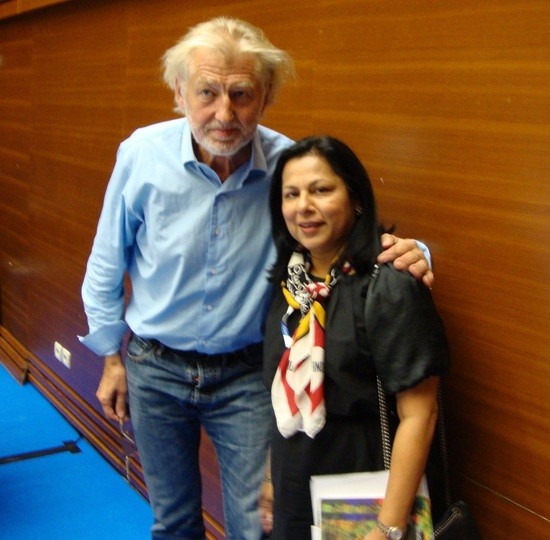
He is a very energetic, intellectual man who is very considered in his speech. Very kind and close to people, and as he said in San Sebastian, he considers his team members as part of his family. He has numerous cookbooks to his credit including one he wrote about cooking with young people. Later, addressing the conference and during his demonstration at the Gastronomika, he spoke about the special culinary epoch in France right now and all that was changing in cuisine in France and elsewhere. According to him we are looking at an evolving society and society has a bearing on the food culture of today and how it is changing whether it is in the context of a three star restaurant or a bistro. He spoke about how there was a movement away from molecular to more avant-garde cuisine right now. Needless to say, we were all hanging on every word he spoke. Numerous chefs around the world have benefitted from training with him (including my friend Elena Arzak, whom he spoke of with great affection during our conversation) and his influence has spread across continents.
Gagnaire is known for changing the classic face of French cuisine by his clever juxtapositions of products; varying textures and what seem at first strange combinations (think chocolate and eel!). I can never forget a squid dish which was not much to look at, but the taste….unforgettable. Strangely he talked about how he always worried that his dish was not good enough and how he is never done with a recipe or a dish and goes back to tweak it some more. He brings creativity and emotion to the food he creates. Watching his demonstration at the convention later I could sense his nervous energy. Unlike the other chefs it was a completely natural and unrehearsed demo; both the chefs (he with his able assistant Louis) figuring out the appliances as they worked. There was the usual slide show and a short film but it was not like the slick documentaries that most other chefs present. Sometimes you remember the visuals more than the conversation or demonstration by the chefs.
His career that started in his hometown of St. Etienne and has had its share of ups and downs but he has come back stronger to stay and make his mark in the city of Paris and elsewhere in the world. He opened his first restaurant in 1981 and by 1993 had three stars. In 1996 after a challenging financial situation and losing his restaurant in the process he moved to Paris and shortly regained his stars and stature in the world of cuisine. The jazz trumpeter Chet Baker, the contemporary artists such as Jackson Pollock and Cy Twombly, writers like Jim Harrison and Gustave Flaubert and even a Hermes perfume are sometimes the inspirations behind his creations.
If you are a creative cook or an adventurous diner you cannot help being star struck by his power to take simple products into a whole new level (it's not always foie gras soup with lentil gnocchi). Everything you taste created by this masterful chef wows you. Even the tisanes at the end of the meal specially blended with his direction (French equivalent of herbal teas). He is a very accomplished cook who opened the doors to fusion of cuisines that many young chefs have embraced today. He has influenced cuisine and cuisiniers all over the world and that includes me.
For me one of the most thrilling moments to date was a few weeks ago when I answered the phone at home one evening and the voice on the other end said “Bonsoir Geeta it is Pierre Gagnaire.” He had called to set up a time to meet with me again and answer some more of my questions. To say the least it will be one phone call I will never forget. So off to Vegas I went along with my questions for him.
I chose not to include pictures of his food in this article since I feel he is much more than his beautiful plates; a very evolved, introspective, and gifted man and I wanted to introduce that side of him.

Questions for Pierre Gagnaire
What is your philosophy about food?
I believe food should give pleasure and we must do our best to cook with honesty. For me honesty on the job is very important, in the way we cook, honesty with the product, with your team and finally with your guest and at the same time in the back office with the producer and your staff. You must bring out your true self in your work.
“The cuisine, it is all about putting generosity before rigour and pleasure before lucidity.” – Pierre Gagnaire
What is the biggest change you have observed in food in the last decade?
The biggest change in the last ten years has been in society itself. The real change started in 1975, almost 40 years ago with the introduction of nouvelle cuisine. At that time the first French chefs visited Japan and came back with the realization that food can look beautiful on a plate. This was the biggest change in the French food from before, evidentially then food presentation at that time was not at it's best. It was the same in Spain and Italy.
After that every country and their cuisine started to evolve and want to leave its own message for example Peru, Korea, Japan, Norway etc. (Japan, he had told me in San Sebastian, changed presentation, introduced flora, gardens, and spirituality to cuisine. Spain according to him had brought out the joyful aspect in food as well as the animality of food)
I am surprised that the French and France have still maintained the standard of food in general and sustained the art of the job. Many chefs are inspired by the French cuisine and techniques.( we spoke about Gaston Acurio the Peruvian chef and his training at Cordon Bleu and his perfect French as an example). Here in Las Vegas it is a business, I am happy to be here now but in the beginning it was not my choice. I wanted to be at home in my restaurant in Paris and cook with my favorite products there, but in this day and age it is not possible. Now we must move. It is good and dangerous.
So you think it is changing the essence of food?
Certainly, I do feel that.
Do you feel that diners want to have a say in the direction a chef takes with food?
No, I don't think so.
So you think you want to be honest with yourself and present what you want to, as you said society is changing and are your choices influenced by the diners desires?
No, I can say that for myself I just do my job, there is a necessity to pay attention to these things but in the end it is my job that I must do.
For example here in Las Vegas my ambition is not to be the best restaurant in the city. I try to do my best and I am fortunate that I have my business and home in France and here I am contracted with the company (Mandarin Oriental) to bring out my essence in my work here.
We must respect the city and the hotel. If they say they want something we try to do it but there is still a line that we cannot cross and we stop there.
What are the most important attributes that you think a chef or cook must have?
Honesty, a good heart, cook with love, and to stay true to being a chef. Today it seems when you give an interview, have a TV show you move away from that and lose your focus.
My life is in the kitchen and I don't like taking out time to give interviews etc but here I am talking to you as you are not a journalist and also today my restaurant is not open (Monday) and so I am answering your questions which is usually impossible to do.
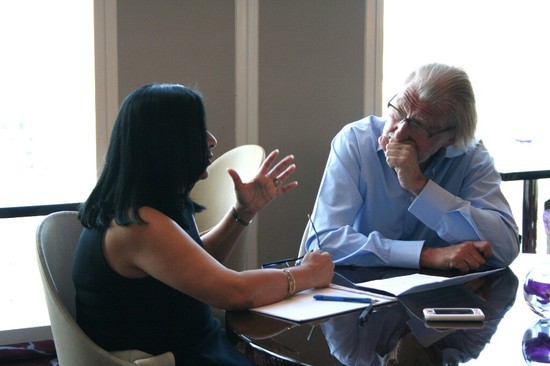
What is the best meal you have had on your travels and I know I asked about this in San Sebastian as well and I am repeating the question?
It is impossible to answer that question. There are so many choices and so many cuisines and I like all cuisines.
What is your favorite meal when you are at home and do you cook for yourself or family and friends?
It depends on the season and the place where I am. I am lucky to have a house on an island in Brittany (France). When I am there I cook a lot of fish and there is very good lamb there as well. It depends on the location, the city or countryside where you can cook with all kinds of herbs.
Do you enjoy making presentations at food shows like Madrid Fusion and Gastronomika etc?
No I don't particularly like to do that. I don't like to travel for conferences, I only travel for work. It was an exceptional case that I went to San Sebastian last year because I have very good relationships in that area with Basque chefs like Juan Mari Arzak etc. I am very busy with my work so it is not possible for me to attend these events.

You say you don't like to do demos but it is very inspiring to people like me. I just did a soup inspired by you at my event with Whole Foods recently. It was my complement to you.
Sometimes it is funny how through your food you can communicate with other chefs. Occasionally there are good moments in such communication. I enjoy these moments but not too much. You cannot give too much of time as it takes me away from my obsession to do my job well. When it is your restaurant and you serve paying guests, it is not for fun, you must try to give your best, you must be focused. Focus, focus, focus.
Most of the younger chefs can be found in a different country every week at food conferences and forums. What is your opinion about that?
For me it is impossible to do these things. I need to stay in my kitchen, I need to be quiet to be able to think.
I have seen you when you are cooking, you are happy and it's like you are saying this is my life and I love what I do.
Absolutely!
It is not about the business, it is about my passion for my work.
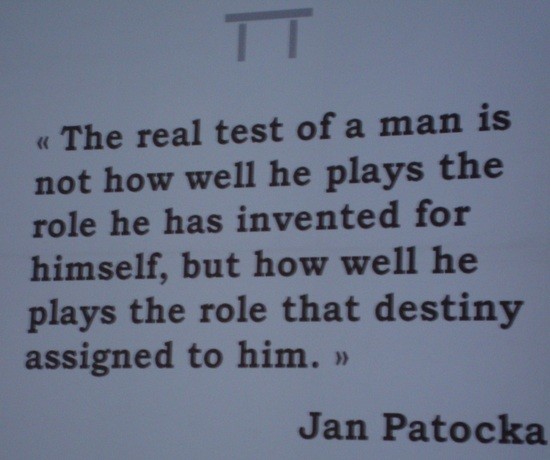
What is the biggest difference in the operations of fine restaurants in Europe and those in Asia?
The product is the first difference and that is the truth. Korea is not China, China is not Hong Kong, …Japan, Indonesia, Thailand and Cambodia are all different, each country has its own personality and is different. It is the same in South America. Guatemala is not Peru and Peru itself has important regional differences. It is not just the product that is important, it is the people cooking it as well. You need a good chef to obtain the best from the product.
When designing menus for your restaurants all over the world do you take into account the local culture and products?
Certainly, the local products and culture are important in the menus. I do get involved in the design of the restaurant as well but not always. In Seoul I did, in Tokyo I did not. It depends on the country.
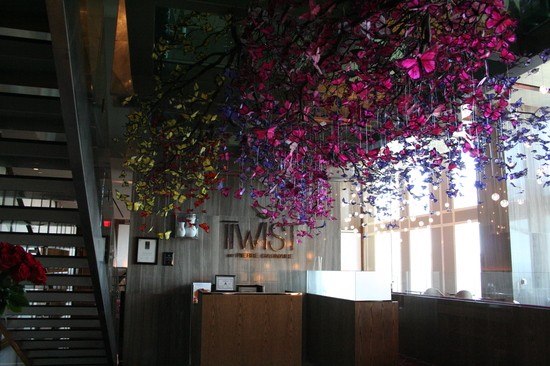
How about Moscow, I was there two years ago.
No, I was not involved there.
You are still opening new ventures but do you have plans to slow down at any time and take time for yourself?
We just opened five months ago in Bahrain. For the moment that is all.
How about slowing down?
(Laughter)…No, no.
What inspires you the most? I know you love jazz and contemporary art, do these play a role in your creations?
The silence is the most important for me, for example the restaurant (Twist) is closed today, I sit here and take some time with myself which I think is most important.
So you take mental stock of yourself?
Absolutely.
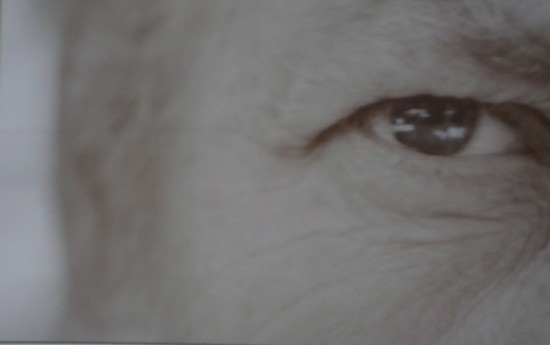
Tell me about the music you like.
Chet Baker (jazz trumpeter) is my favorite artist and I like all his compositions. I love this artist!
Do you play yourself?
I did when I was younger but not any more.
Last time at the Gastronomika you mentioned that you constantly refer to your cookbook by Escoffier. What is so important about the past that you feel we must refer to it for the future we are creating?
I am not obsessed with that cookbook! (laughing)
I just mentioned it for reference.
For me it is Escoffier, who is not a god but he started the beginning of the real story of the profession. It was the first time that someone wrote a book like that. It does not explain everything very well, and there are many absurd recipes in it but it was the first important book after Menon and Carême. (Carême wrote the encyclopedic L'Art de la Cuisine Française 1834, which included, recipes, menus and opulent table settings, the history of French cookery, and instructions for organizing professional kitchens)
The modern cuisine is based on Escoffier because he was very clever to establish a base for modern cuisine. (Escoffier published Le Guide Culinaire in 1903, which is a major reference work, cookbook and professional guide).
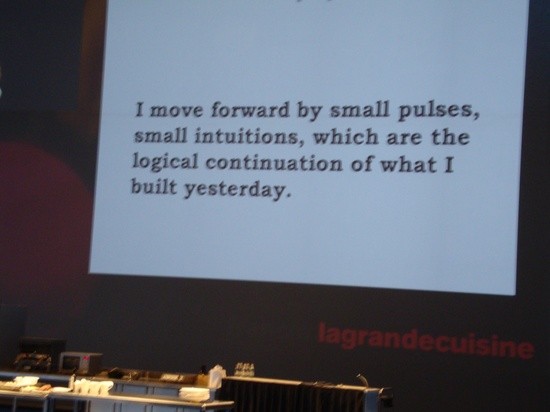
His thoughts on the progression of cuisine
What role do chefs play in the cultural makeup of society?
Chefs have no role except to be a cook and do their job. That's it.
Nowadays there seems to be a confusion about this. What do you think?
No, please no! A chef is a cook. You have your personality, your identity, an idea like everyone else in the world, concern for problems of the environment etc. Just like artistes we are not there to explain these things to the world. It is not our job.
In San Sebastian I had asked about how the fiscal problems of the world are affecting operation of restaurants. Do you feel as if things are improving?
Certainly, it is not just the fiscal problem but the problem is even weather for example, (my meeting was on April 1st) two days ago there was massive snowstorm in Europe that caused a lot of problems, in the desert there are problems with water supply since more hotels are coming up constantly. Those are the real problems.
For me it is complicated to speak about that because I don't like these projects and I think it is possible to live simply with the minimum…a glass of water, a few figs, etc.
Why I speak about honesty, about society because we must (chefs) try to give a beautiful dream to people so that gives us justification to work with products. For me my work must be like a piece of art and not just fun.
I am like everyone else in that I work a lot and I have financial obligations to take care of every month but I am not doing it just for myself.
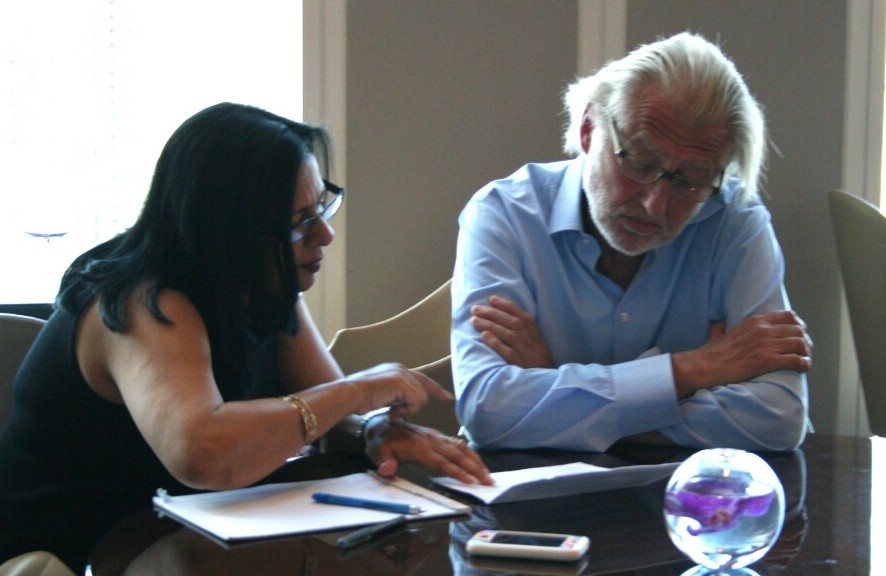
Who are the young upcoming chefs that you think are gifted and creative? Chefs like Pascal Barbot, Rene Redzepi, Bertrand Grebaut. Albert Adria, Alex Atala, etc?
You know them just like me. The word creative is difficult to define. Creativity for the sake of creativity does not make sense. There are many chefs in the world but 20-50 chefs are good, but these days there is a fashion to talk about this.
The way to cook continues to evolve and now young people are involved in this job who try to give their best and we know when we do that we don't make money and that is interesting because at this time the conversation has just become about money, money, money. In this city (Las Vegas), at this time it drives everything. When a chef works for himself it is not the same as when he works for a big company. Working for yourself is more complicated.
How important is technology in gastronomy at this time and do you think it is overtaking the culinary art?
It is important, but at the same time it is not the most important thing, and if it is there why not use it. (He collaborated in 2000 with French chemist Hervé This on introducing many new techniques into the kitchen and also co-wrote a book “Cooking: The Quintessential Art” by Hervé This and Pierre Gagnaire)
Most notable young chefs operate labs and have R & D departments these days. What is your opinion about this phenomenon?
Why not! (He laughed at my comment about a chef being a scientist).
The problem is the press, they don't take time to have a good perception of the people they write about. It is nothing new that they write, just the same information that is already out there. The good (journalists) ones are modest, they take time and don't put out facts without comprehending them first.
I see here at Twist on your menu that you reference Tandoori spices–does Indian cuisine interest you?
It interests me, but not by itself, for me the herbs, spices, the water, alcohol, wine, syrups (in San Sebastian he had disclosed that he was excited about having found a use for ginseng syrup in his food) are all important. With cognac, whiskey, and rum if you pay attention to the quantity and quality you can do many things. Same with cheese, vegetables etc.
I used tandoor and tandoori spices 25 years ago. I was the first to use it in French cuisine but I am not obsessed with that. It is true I like curry, satay etc. 20years ago my curry spices used to come from Jodhpur (a town in Rajasthan, India). I had a fantastic relationship with that family and have since lost touch.
When it is a good chef who has travelled, who adapts their culture then there are many things you can do with this Indian cuisine. The spirit of this culture is incredible.
How about sushi?
I like sushi and eat it in many places in Japan.
Jiro Sushi?
(Smiling) It is good but very very expensive!
I am looking forward to seeing Mr. Gagnaire in Paris at 6 rue Balzac and having another conversation with him. I have been fortunate to meet and converse with numerous culinary giants in the world but this conversation was very different. I came away with the sense of having been able to exchange ideas and also that my opinion mattered and he gave it his very patient consideration. He is very real and most passionate about his work yet very relatable and brilliant at the same time. He has studied his art well and hence is able to offer educated opinions related to the world of cooking. I am still absorbing all that I learnt in this exchange.
Merci Beaucoup Mr. Gagnaire!
Visit www.facebook.com/clayovenirvine for more pictures and conversation!


One Reply to “Geeta Bansal Interviews Pierre Gagnaire, French Cooking Legend”